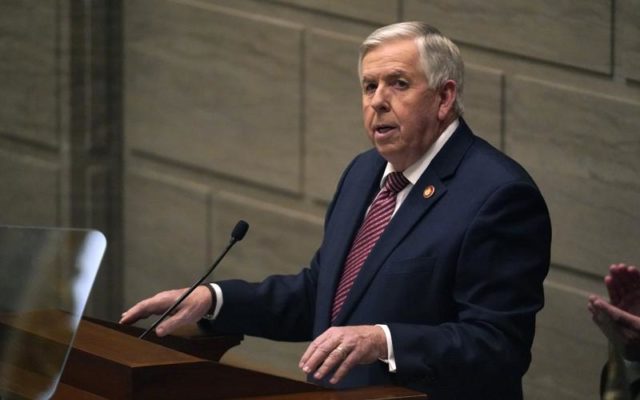THE EGGLESTON REPORT – ONE WEEK LEFT

Eighteen weeks of legislative work will come down to one final hectic week – as it always does – from May 10 to May 14. Many big issues (and a bunch of little ones) have yet to pass and hang in the balance. Here are a few of them.
Gas Tax: A couple years ago, a gas tax was on the ballot, which was rejected by voters. This year, a senator has proposed a gas tax increase that the legislature would impose without a vote of the people. It would raise the gas tax 12½ cents per gallon over five years, with a rebate mechanism where citizens could claim the extra gas tax as a credit off of their income tax. Some say an increase is needed to maintain our roads and bridges. Others say they don’t trust that more taxes will lead to better roads, or that no tax increase should occur without a vote of the people who would be taxed.
Vaccine Passports: Some governments are requiring citizens to get a Covid vaccine before allowing them to travel or enjoy the normal privileges of life. Some corporations are requiring their customers to get vaccinated before they can enter their businesses, or requiring their employees to be vaccinated to keep their jobs. The legislature has debated which, if any, of these restrictions are acceptable, and which go too far and violate individual freedom.
Wayfair: Some members want to collect a sales tax from citizens on internet purchases that are not already taxed to raise money from citizens for state and local government. Other members are okay with an internet sales tax to help our Missouri local businesses better compete with their internet rivals, but only if it is offset with some tax reductions so businesses have a level playing field and citizens are not financially harmed. And other members do not want an internet sales tax with or without a tax offset.
Transgender Sports: The legislature has debated whether or not a boy who identifies as a girl should be allowed to play on a girls’ sports team and compete with girls in high school sports, or if that would be unfair to the girls to have to compete with and against biological boys.
Election Integrity: Several bills have been debated to reform elections, including voter photo ID, requiring paper ballots, more secure absentee ballots, and changes to the initiative petition process that puts amendments to our constitution up for a vote.
These are just a few of the issues yet to be hammered out. Which of these measures will pass, and which will fail? We will know in a week, and I will let you know in my capitol reports in the coming weeks.
Until next time, health, happiness and prosperity to you and your family.
PICTURES FROM THE CAPITOL
The Missouri State Capitol in Spring

OTHER NEWS FROM THE CAPITOL
House and Senate Give Final Approval to FY 2022 State Operating Budget (HBs 1-13, 15, 18, 19)
Members of the House and Senate wrapped up work on the Fiscal Year 2022 State Operating Budget on Friday. The fiscally responsible spending plan continues to support state operations and programs that will help lead Missouri out of the pandemic. In total, the budget contains $35.6 billion of state and federal spending authority. The appropriations bills that make up the spending plan will now head to the governor’s office for his consideration.
- Record Investment in K-12 Education
The final version of the budget makes a significant investment in the state’s system of education. Once again the legislature has fully funded the K-12 School Foundation Formula. The record investment for early childhood education and K-12 education checks in at nearly $7.5 billion. The final version of the state operating budget also includes a $20 million increase for K-12 school transportation, exceeding more than $110 million in funding for the first time in several years.
The spending plan also includes:
- $7.3 million in federal funds for the Governor’s Emergency Education Relief Fund (GEER II) to help meet needs in K-12 schools
- $5 million for a deferred maintenance grant program for charter schools who own their own building or a building owned by the local school district
- $3 million for a Rural Advising Program to help high school students and counselors in rural areas with college entry
- $2.5 million to boost reading literacy in the St. Louis area
- $3.25 million to initiate the School Turnaround Act
- $2.1 million in new funding for parent education development screenings (Parents As Teachers)
- $500,000 to help support the Missouri Scholars & Fine Arts Academies
- $50,000 for tutoring and other educational programs at the W.E.B. Dubois Center in Kansas City
- Funds that transition childcare services, early childhood education, and the state’s home visitation programs under one umbrella called the Office of Childhood
- Enhanced Support for Higher Education
The Fiscal Year 2022 State Operating Budget also includes an enhanced commitment to Missouri’s institutions of higher learning. The plan provides $67.5 million in restored funding for four-year public institutions. This is restored funding that was previously lost due to the pandemic. The plan also provides a 3.7 percent funding increase for the state’s four-year universities, an additional $10 million for the state’s 12 community colleges, and $2 million core funding increases for the State Technical College of Missouri and Missouri Southern State University. In total, more than $1.41 billion is committed to students, colleges, and universities.
Other budget items of note for higher education include:
- $10 million for the University of Missouri’s NextGen Precision Health Institute and another $15 million to match funds for a new veterinary medicine diagnostic laboratory
- Increases to all four of the state’s primary scholarship programs: A+, Bright Flight, Access Missouri, and Fast Track
- $1 million in new funds for the Delta Research Center
- $1 million in new funds to Harris-Stowe State University to begin an entrepreneurship program and to establish an urban police training program
- $1 million increase for Lincoln University to match with federal land grant funds
- $325,000 to support the MU Veterans Law Clinic that provides legal assistance to military veterans
- More than $20 million in additional spending for new MoExcels programs across several Missouri campuses
- $1.2 million in federal funds for the Dislocated Worker Grant
- $2 million to establish a nursing simulation laboratory to train new nurses in a field that has incredible demand at this time
- $4.6 million to help complete renovations for the Greenwood Autism Center at Truman State University
- $18 million in funds to meet deferred maintenance needs for every community college
- $11.5 million in funds to match funds for the construction of buildings for technical education programs in Ashland, Perryville, and near Farmington
- Protecting Missouri’s Vulnerable Children
The 2021 legislative session has seen the General Assembly make a commitment to provide additional resources to foster and adoptive parents. The state operating budget also includes funding to ensure vulnerable young people can find a nurturing home. The plan provides a $40.7 million increase for adoption and guardianship subsidies, as well as a $12.8 million increase to Foster Care Maintenance Payments that support families with foster children.
Other funding items of note include:
- $4.8 million to provide behavioral health supports for children in foster care and their families
- $3.9 million for a rate increase for respite services for foster and adoptive families
- $2.7 million increase for foster family recruitment
- $1.3 million increase in support for Infant Care expenses for kids in foster care
- $1.2 million increase in funds for clothing allowances for children in foster care
- $4.8 million to hire new attorneys and contract attorneys for permanency and foster care legal representation in Missouri’s courts with the intent of decreasing wait times for adoptions, termination of parental rights, and guardianship issues
- Funding for Other Essential Services
Lawmakers also included funding to help the approximately 46,000 Missourians who were mistakenly paid unemployment benefits through no fault of their own. The budget includes $48 million to cover the repayments owed by those who non-fraudulently obtained benefits. The final version of the state spending plan also includes $142 million for mortgage help and $442 million for rental assistance. The funding is meant to protect Missourians who lost income during the pandemic from being evicted.
Other key funding items include:
- $50 million to offset revenue changesto hospitals from a new Outpatient Simplified Fee Schedule set to go into effect July 1.
- $1.6 million for improvements to weigh stations across the state
- $541,047 to increase the assessment maintenance subsidy that county assessors receive to $3.15 per parcel
- $300,000 to help state agencies with black vulture mitigation
- $4.6 million for various improvements to Missouri’s veterans homes
- $5.3 million for “Raise the Age” for the Division of Youth Services to provide services for children age seventeen who are engaged in the criminal justice system
- Another $13.2 million for the judicial branch to handle “Raise the Age” cases
- Funding for 53 new public defenders to help with a backlog of cases
- $671,714 in funds to convert Crossroads Correctional Center into a training academy for incoming correctional officers
- $21.3 million in new funding to increase salaries and retain corrections officers
- $14 million in new funding for the Aid to Counties program (prisoner per diem)
- $2.5 million for a recidivism reduction program that works with recently released prisoners
- $134.1 million in federal stimulus funds for the Department of Health and Senior Services to continue coronavirus mitigation efforts
- $146.7 million in total funds to increase reimbursement to those providers who take care of Missouri’s developmentally disabled population
General Assembly Approves Bill to Empower Students to Succeed Academically (HB 349)
The House and Senate have given final approval legislation meant to empower parents to have access to schools and educational resources that will best meet the needs of their children. The legislation will create Empowerment Scholarship Accounts (ESAs) to help parents afford the best educational opportunities for their kids.
House Speaker Rob Vescovo, who made the bill one of his top priorities, said, “Today we passed transformative legislation that will provide other educational opportunities for children in our state. From the day I was sworn in, I have made education reform and improving the lives of our state’s children my top priority. I am thankful for my many colleagues who worked diligently to pass HB349. It’s a good day for Missouri students.”
The bill’s sponsor said ESAs will be “a lifeline” for many children in failing schools across the state. He noted the accounts will empower “parents with choices and alternatives so they can find the fit that is best for them.”
The bill will create nonprofit groups known as Education Assistance Organizations (EAOs) that would be responsible for awarding the scholarships. Funding will come from individuals who donate to the EAO and receive a tax credit for up to half of their overall tax liability. The program will be capped at $50 million per year and could be adjusted for inflation each year up to a maximum cap of $75 million.
Each EAO will make sure scholarships are distributed in a prioritized order. The top priority will be students with an approved individualized education plan and students living in a household whose total annual income meets the income standard for free and reduced price lunches. Scholarships can be utilized for things like tuition, text books, computer hardware and software, educational therapies, tutoring, virtual school, and after school programs. Each EAO is responsible for ensuring student recipients are tested to measure learning gains in math and English, and for reporting these results along with graduation rates, college attendance, and a parental survey.
The bill includes a number of accountability measures to ensure ESAs are used appropriately. It will require EAOs to be registered with the IRS, bonded, to conduct background checks on their employees, to keep overhead costs to a minimum, and to allow the State Treasurer to audit them at any time. The bill also contains a penalty provision for any EAO or parent who tries to misuse the scholarship funds.
Additionally, the bill will prohibit the program from going into effect until funding for K-12 public school transportation is increased by approximately $18 million. Scholarships will be limited to students in cities with a population of 30,000 or more. The bill will also allow public schools who see students leave the district because of an ESA to continue receiving funding for those students. The provision will end five years after the bill goes into effect.
Legislature Approves Bill to Protect Victims of Domestic Abuse (SB 71)
Legislation is now on its way to the governor that would allow victims of domestic abuse to obtain lifetime orders of protection against their abusers. The bill received overwhelming bipartisan support in both the House and Senate.
Under current law, a court can issue an order of protection for up to one year. Supporters of the bill said some victims of abuse are subject to fear and trauma when they have to see their abuser each year to ask a judge to renew the order. The bill approved by the General Assembly would allow the court to issue orders of protection for at least two years and up to 10 years if an evidentiary hearing finds the abusers pose a serious danger to the physical or mental health of the victim or a minor household member. In these cases, the order could be renewed periodically and be valid for at least two years and up to the lifetime of the abuser.
The House handler of the bill, who previously served as the director of the Missouri Department of Public Safety and as the Joplin Police Chief, said, “I spent a great deal of my life having to look women in the eye and explain to them why I could not do what I knew needed to be done to help them, and I had to leave them living in fear and could not put a stop to it. Finally I find myself in a position to actually do something about it. If I never do anything more in this body than pass this particular bill I will still have made a contribution that I’ll take home and feel good about.”
Under the bill, a judge considering whether an order should last for a lifetime would consider the evidence of the case; the history of abuse, stalking, and threatening; an abuser’s criminal record; previous orders of protection; and whether the respondent has violated probation or parole, or previous orders of protection. The abuser would be able to have the order of protection against them lifted only by showing “proof of treatment and rehabilitation” and that they no longer pose a serious threat.
The bill also would update the definition of stalking to include acts in which the stalker directly, indirectly, or through a third party follows, monitors, observes, surveils, threatens, or communicates to a person by any action, method, or device. In addition, the bill would allow courts to include pets in orders of protection. This would include awarding possession of a pet and considering abuse or threatened abuse of a pet in making decisions in the case. Supporters said abusers often threaten or harm a pet in an effort to control or terrorize a victim.
Providing Skilled Veterans with a Direct Path to Licensure (HB 476)
Missouri will soon cut bureaucratic red tape to ensure more skilled veterans are able to work and practice in the state. Under legislation on its way to the governor, the state would recognize military occupational specialties for licensure.
Specifically, the legislation includes a Military Occupational Specialty as a type of licensure when applying for licensure in Missouri in the same occupation under Missouri’s Reciprocity Laws. The bill’s sponsor said the bill will allow military men and women to use the training they received while serving to come home and get skilled jobs, and to continue utilizing the skills they have worked so hard to obtain.
“This bill is critical in addressing veteran unemployment and helping our veterans attain skilled jobs they are already trained for,” said the sponsor.
The bill also includes language that allows trained health professionals such as nutritionists to practice their profession in the state of Missouri. Current law restricts the activities of nutritionists, health coaches, and other individuals who want to be able to give advice about food.
The sponsor said, “This bill expands access to diet and nutrition advice and will help make Missouri a healthier state.”
The bill now awaits the governor’s signature to become law.
Other Bills Truly Agreed to and Finally Passed
SB 49 modifies provisions relating to watercraft. The act provides that vessels may be issued a permanent certificate of number upon payment of 3 times the amount required for a 3-year certificate of number and 3 times any processing fee applicable to a 3-year certificate of number. The act prohibits vessels positioned within 100 feet of a permitted boat dock from being anchored in a manner that obstructs ingress or egress of watercraft to or from the dock, unless authorized by the boat dock permit holder.
SB 176 modifies provisions relating to electronic devices. This act requires food delivery platforms to register with the Secretary of State prior to taking or arranging food pickup or delivery from a restaurant, as defined in the act. The act creates a definition for electric bicycles of three classifications, and excludes electric bicycles from definitions for other types of vehicles. The act exempts electric bicycles from certain vehicle lighting requirements, and provides that operators of electric bicycles shall have the same rights, duties, and responsibilities as operators of other vehicles. The bill also enacts provisions relating to personal delivery devices (PDDs). PDDs may operate on sidewalks and crosswalks, and may operate on county or municipal roadways provided they do not unreasonably interfere with motor vehicles or traffic.
HB 574 specifies that the Missouri Department of Agriculture, the Missouri Department of Natural Resources, the county sheriff for the county in which the facility is located, the United States Department of Agriculture, and any other federal or Missouri state agency with statutory or regulatory authority shall have exclusive authority to inspect the grounds or facilities located in Missouri for the production of eggs, milk or other dairy products, the raising of livestock or poultry, or the production or raising of dogs or other animals that are not used to produce any food product. No person, individual, corporation or other association, governmental entity, or any other entity shall inspect such grounds or facilities to enforce or carry out the laws of Missouri or any other state unless specifically requested by the owner of the grounds or facilities, or pursuant to a search warrant lawfully issued by a court of competent jurisdiction. The act will not apply to inspections performed in charter counties or the city of St. Louis; inspections performed on any further processing component of any production agriculture farm; or certain searches carried out by Department of Conservation agents and other law enforcement officers. In addition, the act will not apply to grounds or facilities used for the production or raising of dogs or other animals that are not used to produce any food product.
HJR 35 is a constitutional amendment that, if approved by the voters, would modify the powers of the State Treasurer. Specifically, the State Treasurer is required to invest state moneys not needed for current expenses in Missouri banking institutions selected by the State Treasurer and approved by the Governor and State Auditor or in obligations of the United States government or any agency or instrumentality thereof maturing and becoming payable not more than seven years from the date of purchase. The amendment additionally authorizes the State Treasurer to invest in municipal securities possessing one of the five highest long term ratings or the highest short term rating issued by a nationally recognized rating agency and maturing and becoming payable not more than five years from the date of purchase; and other reasonable and prudent financial instruments and securities as otherwise provided by law.
SB 120 modifies provisions relating to military affairs, including state designations, hiring preferences and classifications for state employment, state agency services, school designations, military protections for motor vehicle insurance, and qualified military projects in the Missouri Works Program.
HB 362 modifies provisions regarding the Sunshine Law. A public governmental body is authorized to close records and meetings related to evacuation and lockdown procedures on property owned or leased by the body. Information submitted by software or surveillance companies that secure access to buildings of the body may also be closed. A public governmental body is authorized to close records that are related to email addresses and telephone numbers submitted to a public governmental body by individuals or entities for the sole purpose of receiving electronic or other communications. The public body may also close records of utility usage and bill records for customers of public utilities unless the customer requests them or authorizes their release. The bill also enacts the Government Lending Transparency Act that creates new reporting requirements for the state auditor relating to state lending and credit support programs.
HB 685 lowers the minimum age requirement to 21 years for holding various county offices and special district board memberships. Included in the offices and districts affected are: county clerk; county auditor; county coroner; county surveyor; seven-director school board; ambulance district board; sewer district trustee; public water supply district board; emergency telephone services board; hospital district board; fire protection district board; court clerk; and mayor for third or fourth class cities. Supporters say the bill has received overwhelming support in past years and there is no reason to restrict local offices to a minimum age requirement in excess of the standard 21 years of age. A residency requirement for the Office of Attorney General is also repealed by the bill. The bill also stipulates that no person shall be appointed to an elected public office who is delinquent in the payment of any state income tax, personal property tax, municipal tax, or real property tax. Additionally, it provides that each candidate for county recorder shall provide to the election authority a copy of an affidavit from a surety company authorized to do business in this state that indicates the candidate is able to satisfy the bond requirements of the office.



